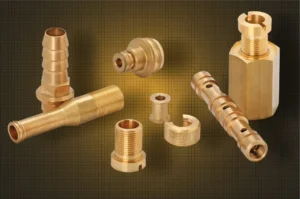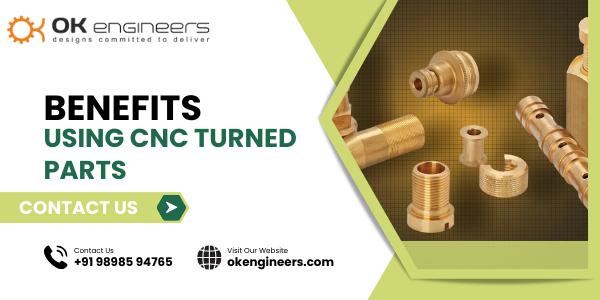Manufacturing processes have evolved significantly over the years, and one of the revolutionary advancements is the use of CNC turned parts. CNC, which stands for Computer Numerical Control, turning is a precision machining process that offers a plethora of benefits to various industries. In this blog, we’ll delve into the advantages of utilizing CNC turned parts, with a particular focus on the versatile and durable “BRASS TURNED PARTS.”
Understanding CNC Turning
CNC turning involves the use of computer-controlled machinery to shape raw materials into intricate and precise components. This process is widely utilized in the manufacturing sector to create cylindrical parts, including those made from brass.
Types of Materials Used in CNC Turned Parts
Brass, a metal alloy of copper and zinc, is a popular choice for CNC turned parts. Its exceptional properties, such as corrosion resistance and malleability, make it a preferred material in various industries. The utilization of BRASS TURNED PARTS ensures durability and longevity.
Precision and Accuracy
One of the standout features of CNC turned parts is the unmatched precision they offer. The computer-controlled machinery ensures accurate and consistent results, meeting the strictest manufacturing tolerances.
Cost Efficiency of CNC Turned Parts
While initial setup costs for CNC machining may be higher, the long-term benefits outweigh the investment. Reduced material waste, increased production speed, and minimal manual intervention contribute to the cost efficiency of CNC turned parts.
 Versatility in Design
Versatility in Design
CNC turning provides unparalleled design flexibility. Complex shapes and intricate details can be achieved with ease, catering to the diverse requirements of different industries. This versatility is especially advantageous in producing BRASS TURNED PARTS with unique designs.
Speed and Efficiency
The automated nature of CNC turning accelerates the production process. Quick turnaround times contribute to efficient manufacturing operations, meeting tight deadlines without compromising quality.
Quality Assurance in CNC Turned Parts
Quality control measures in CNC machining guarantee consistent and reliable output. Each piece undergoes stringent checks, ensuring that the finished components meet the highest standards.
Environmental Impact
Sustainability is a key consideration in modern manufacturing. CNC turned parts contribute to environmentally friendly practices by minimizing material waste and energy consumption during production.
Applications of CNC Turned Parts
Industries such as aerospace, automotive, and medical sectors benefit significantly from the use of CNC turned parts. The ability to produce precise components makes CNC turning a cornerstone in manufacturing technology.
Challenges and Solutions
While CNC turning comes with its challenges, such as tool wear and programming complexities, continuous advancements address these issues. Cutting-edge solutions enhance the efficiency and reliability of CNC turned parts.
Innovation in CNC Turning
The field of CNC turning is dynamic, with ongoing innovations shaping its future. From advanced tooling to the integration of artificial intelligence, the industry is on the cusp of exciting developments.
Selecting the Right CNC Turning Service
Choosing a reliable CNC turning service is crucial for optimal results. Factors such as experience, reputation, and customer reviews should guide the selection process to ensure quality and satisfaction.
Safety Considerations
Maintaining a safe working environment is paramount in CNC turning. Adhering to safety protocols and providing proper training to operators minimize risks associated with the machinery.
Conclusion
In conclusion, the benefits of using CNC turned parts, especially BRASS TURNED PARTS, are manifold. Precision, cost efficiency, versatility, and sustainability make CNC turning a cornerstone in modern manufacturing. Industries embracing this technology gain a competitive edge in delivering high-quality products with speed and accuracy.
FAQs
- Are CNC turned parts suitable for small-scale production?
- Yes, CNC turned parts are ideal for both small-scale and large-scale production, offering efficiency and precision.
- What makes brass a preferred material for CNC turned parts?
- Brass is chosen for its corrosion resistance, malleability, and durability, making it an excellent material for various applications.
- How does CNC turning contribute to environmental sustainability?
- CNC turning reduces material waste and energy consumption, aligning with sustainable manufacturing practices.
- Can CNC turned parts be customized for specific industry requirements?
- Absolutely, CNC turning provides the flexibility to customize parts according to the unique needs of different industries.
- What safety measures should be taken when working with CNC turned parts?
- Operators should follow safety protocols, undergo proper training, and use personal protective equipment to ensure a secure working environment.



